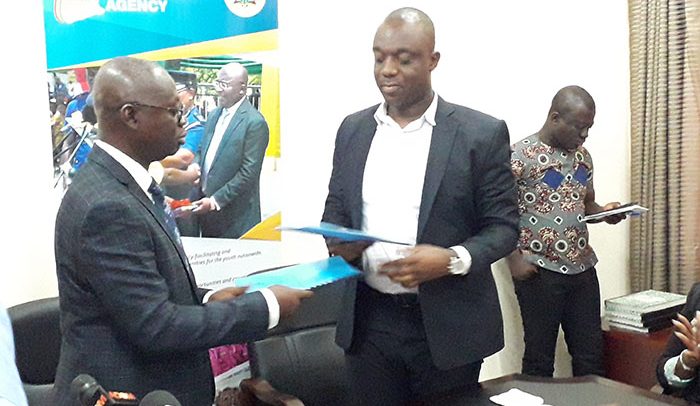GES Director Prof Amankwa exchanges document YEA Boss Mr Frimpong
The Ghana Education Service (GES) and the Youth Employment Agency (YEA) have signed a Memorandum of Understanding (MoU) for the recruitment of 7,730 Ghanaian youth, to provide support services to 700 Senior High Schools (SHSs) across the country.
The recruitment of personnel between the ages of 18 and 35 years, which is to start by the end of the week, with advertisement of vacancies, forms part of the agency’s School Support Programme. The programme is aimed at creating a supportive and an orderly environment for educational activities.
Ghanaian youth under the programme are to be deployed as security guards and kitchen assistants who would respectively provide basic security to students and staff on campuses and help cooks and pantry staff to provide basic nutritional needs of staff and students.
Speaking at the MoU signing ceremony in Accra, on Monday, the Chief Executive Officer (CEO) of YEA, Justin Kodua Frimpong, indicated that the programme was initiated to augment the existing staff capacity of GES that had been relatively stretched with the introduction of the free SHS programme.
“As there has been increase in enrolment in various SHSs, there has also been the demand for teachers and supporting staff,” he said.
The Director General of the Ghana Education Service, Professor Kwasi Opoku-Amankwa, for his part explained that the GES with the inception of the free SHS programme had to recruit 1,500 non teaching staff and 8,000 teachers.
The start of the double track system, he said had warranted the need to augment supporting staff, thereby leading to the collaboration with YEA.
“Once we have the double track, the existing number of staff may have to run shift to ensure that at least they have some rest. But then you will need the numbers to be able to do the rotation,” he said.
He commended the agency for the initiative and also appealed to the general public and prospective applicants to desist from making excuses that would prevent them from being posted to areas where their services would be required.
By Issah Mohammed


